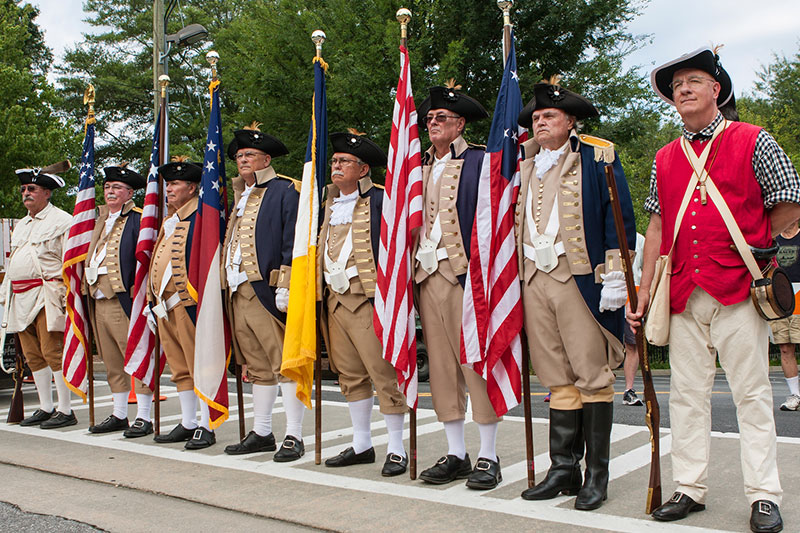On Thursday the Supreme court, in a 7-2 decision, struck down a Minnesota law that had been used to bar voters at polls in that state from wearing pro-Tea Party clothing.
Most states, oddly enough, restrict what people are allowed to wear in polling places. But Minnesota has particularly tough laws that ban voters from casting their vote if they’re wearing clothing related to a political campaign. That means that T-shirts with the names of candidates are off limits.
But it also means that voters couldn’t wear a “political badge, political button, or other political insignia” while voting. Which, considering that voting is a political act, and the whole point of voting is to support a political candidate of your choice in the only way that really matters (and even voting doesn’t really matter that much, in the long run), barring people from wearing political buttons to the polls seems pretty damn stupid.
And the Supreme Court thinks so too. They declared Minnesota’s law unconstitutional, while still leaving states with the option to restrict political clothing in polling places in a less egregiously stupid way.
Chief Justice John Roberts wrote in his opinion that, while it’s not completely unconstitutional for a state to set restrictions on what can be worn to the polls, the way Minnesota handled it was too restrictive and too vague.
Roberts said that the ultimate issue came down to the term “political” in the state law. The law didn’t define that term at all, leaving it open to a very broad interpretation. In this day and age, just about any action, image, or set of words can be considered a political message, from kneeling at a football game to a shirt with a picture of an AR-15 on it.
Roberts also said that Minnesota’s interpretation of what counted as political was too broad, and unreasonable. It forbade just about any item that made reference to a group with recognizable political views. Anything referring to a subject on which a political candidate or a party had taken a stance could also be construed as “political” by Minnesota’s standards.
“Would a ‘Support Our Troops’ shirt be banned, if one of the candidates had expressed a view on military funding or aid for veterans? What about a ‘#MeToo’ shirt…?” asked Roberts.
The answer to that rhetorical question is: yes. Under Minnesota’s law, both of those shirts could be construed as political in nature.
Frankly, it’s only a matter of time before the government of Minnesota starts issuing “matte grey mandatory civic duty jumpsuits” to registered voters. Bands of heavily armed Minnesota state troopers will rove through Minneapolis suburbs over the course of Voting Week, capturing any bands of noncompliers who are seen in public without their jumpsuits.
Any evidence of “partisan bias” will be crushed with the iron fist of the bipartisan state. Women seen wearing red or blue nail polish will be executed on sight. Anyone seen wearing a Minnesota Vikings jersey will be tasered and forced into a “maximum security jumpsuit”, as any expression of loyalty to one’s home team could be construed as partisan bias. And Minnesota must be a bipartisan safe space, after all. Drastic measures may have to be taken. Enthusiastic voters may have to be beaten, or even killed.
But by God, voting is a solemn civic duty. No one can be allowed to enjoy it. No one can be allowed to think of it as, – gasp! – a political act! No no! Why, that would fly in the very face of our hallowed “democratic norms!”
The self-absorption of these political elites is just unbelievable. It’s almost as if they don’t really realise the role that voting serves in the minds of most normal people. People don’t go to the polls because they think of it as a crucial responsibility and a solemn duty.
People go to the polls because they want lower taxes, a stronger economy, fewer criminals in their neighborhoods, more handouts from the government, and a set of leaders they find marginally more tolerable than the alternative options.
In other words, people vote in order to achieve goals and signal their ideological beliefs. They also vote in order to confirm their self-identity. Republicans vote to get the red guy in there, because they are red and their papas were red and they want their representatives to be red too. Democrats vote to get the blue guy in there, because they are blue and their mamas were blue and they want their representatives to be blue too.
Republicans vote for lower taxes and a stronger economy, which is a self-interested action because most Republicans would benefit from those things. Democrats vote for bigger handouts and a better safety net, which is also self-interested.
Are there people on the margins who vote solely out of a sense of civic duty, because they think it’s their responsibility? Sure. But those people are not in the majority. And even if they were, the “civic duty” thing is still a political belief in and of itself, and voters who vote for that reason are still, ultimately, signaling an ideology and confirming their own beliefs about themselves.
So was the Court right to strike down Minnesota’s dumb law? Yeah.
But they should have struck down every other dumb law like it, too. Any law that punishes somebody for wearing a Tea-Party shirt to the polls, which is what caused the legal challenge to the Minnesota law in the first place, is blatantly unconstitutional. The Court should have said so more clearly.
But I guess you gotta take what you can get in this day and age.























